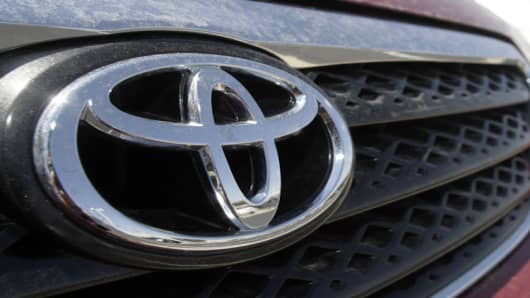"The forecast for an operating profit of 1.6 trillion yen for the current business year is way below what the market expected," said Tatsuo Yoshida, an analyst at UBS Securities.
"The earnings forecast figures are negative for Toyota's share price, likely causing it to give up gains made in its recent rebound," he said.
January-March net profit at Toyota was 316.8 billion yen ($3.0 billion), well below an average estimate of 342.3 billion yen from 20 brokerages surveyed by Reuters Estimates.
Operating profit, which excludes its Chinese joint ventures, fell 30.5 percent to 396.7 billion yen, while revenues rose 3.8 percent to 6.57 trillion yen.
Net profit for the year to March 2008 rose 4.5 percent to a record 1.72 trillion yen.
But for this business year Toyota forecast net profit will fall 27.2 percent to 1.25 trillion yen and operating profit will decline 29.5 percent to 1.6 trillion yen, breaking a seven-year string of record results.
Consensus forecasts from 19 brokerages call for a significantly higher net profit of 1.56 trillion yen and operating profit of 2.0 trillion yen.
Toyota said it assumes an average exchange rate of 100 yen to the dollar and 155 yen to the euro for this business year.
Analysts said one fundamental worry was bloated inventory of light trucks in the United States, which has forced Toyota to scale back production and increase profit-eroding sales incentives.
Sales of the remodelled Tundra pickup truck -- a model Toyota billed as its most important ever in the United States at the time of launch in early 2007 -- fell for the first time last month as a slowing economy and high fuel prices put consumers off bigger vehicles.
Inventory for the Tundra was running at nearly 80 days supply, far above Toyota's average of 46 days, the company said last week.
A company official said it would respond with incentives and new marketing measures, without providing details.
Other Japanese automakers are also suffering. Honda Motor last month projected an 18 percent drop in 2008/09 net profit assuming an exchange rate of 100 yen to the dollar. Nissan Motor is due to announce its results next Tuesday.
Toyota also joined rivals in lowering its projection for total U.S. vehicle demand for 2008 to the low 15 million vehicle range. It had previously reckoned sales would grow 1 to 2 percent from last year's 16.1 million units.
Derivative losses related to lower U.S. interest rates have also dented earnings at Toyota and other Japanese automakers.
On the upside, Toyota -- a latecomer to China -- is now beating the industry in growth in the world's second-largest car market, projecting a 40 percent jump this year to 700,000 vehicles.
It is seeking to replicate those gains with a new low-cost car currently under development for the fast-growing Indian and Brazilian markets, where it lags rivals such as Volkswagen and Suzuki Motor.
By Wednesday, shares of Toyota had lost 7.6 percent this year, faring better than Tokyo's transport sub-index ITEQP, which lost 11 percent over the same period. Honda and Nissan shed about 8 and 21 percent respectively.
Toyota is valued at about $180 billion, almost as much as Volkswagen and Daimler combined. Before the earnings announcement Toyota shares ended down 1.8 percent at 5,480 yen.


